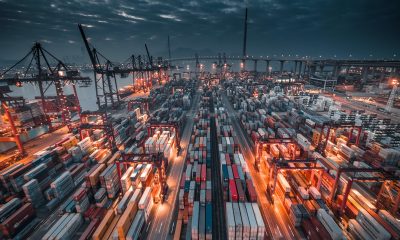Cannabis
Ukraine Legalizes Medical Cannabis to Treat PTSD and Cancer in War Survivors
Under the new law, doctors can prescribe cannabis or drugs containing cannabinoids, and entrepreneurs can obtain a license to grow hemp plants. However, these enterprises will be subject to 24/7 video surveillance, with access for the National Police. Patients with a cannabis prescription will also be able to enter or leave Ukraine with small amounts of the medication.

The Ukrainian parliament voted on Thursday, December 21st, to legalize medical cannabis. The bill allows the use of cannabis and cannabinoid-based drugs for people suffering from PTSD and cancer. Support for medical cannabis grows in Ukraine as war progresses. The bill was sent for signature by President Volodymyr Zelensky, who supports this reform.
The country’s unicameral parliament, the Verkhovna Rada, passed the legislation on Thursday with 248 votes, 16 against and 33 abstentions, according to the legislative body’s official website. This defeated opponents who tried to block the proposal through an avalanche of hundreds of amendments that critics called “spam” last month.
The bill aims to legalize medical cannabis for patients suffering from severe illnesses and post-traumatic stress disorder (PTSD) resulting from the ongoing conflict with Russia, which launched its invasion of Ukraine almost two years ago.
The bill’s text specifically lists only cancer and war-related PTSD as conditions for which medical cannabis can be dispensed to patients. The health committee chairman said in July that lawmakers hear every day from patients with other diseases, such as Alzheimer’s and epilepsy, that they should also have access to medical cannabis.
The bill moves cannabis from the category of strictly prohibited drugs to the category available for medical use on prescription under List II of the Drug Code of Ukraine.
The Ministry of Agrarian Policy will be responsible for regulating the cultivation and processing of marijuana, the Kyiv Post reported. The National Police and the National Medicines Agency will also have supervision and enforcement powers over the distribution of the drug.
In order to ensure access to cannabis-based medicines, this act additionally allows the import of cannabis from other countries.
Read more about the legalization of medical cannabis in Ukraine and find other important cannabis news from around the world with the Hemp.im mobile app.
The bill was debated and reviewed for over a year in Ukraine after its introduction on June 10th, 2022, with approximately 800 amendments submitted since then
President Volodymyr Zelensky must now sign the bill for it to take effect, and lawmakers estimate patients could start receiving prescriptions in the second half of 2024. Zelensky supported the legalization push in a June 28 speech to the nation.
“ All the best practices in the world, all the most effective policies, all solutions, no matter how difficult or unusual they may seem to us, must be applied in Ukraine so that Ukrainians, all our citizens, do not have to endure the pain, stress and trauma of war,” Zelensky said.
Under the new law, doctors can prescribe cannabis or drugs containing cannabinoids, and entrepreneurs can obtain a license to grow hemp plants.
However, these enterprises will be subject to 24/7 video surveillance, with access for the National Police.
Patients with a cannabis prescription will also be able to enter or leave Ukraine with small amounts of the medication.
Maria Mezentseva, a Ukrainian MP and deputy head of the commission overseeing Ukraine’s efforts to join the European Union, said that more than 70% of the country’s population supports the legalization of cannabis for medical purposes.
Mezentseva said in a statement that more than 6 million patients, including civilians, soldiers and cancer patients, need cannabis-containing medicines.
__
(Featured image by Alexander Grey via Unsplash)
DISCLAIMER: This article was written by a third party contributor and does not reflect the opinion of Born2Invest, its management, staff or its associates. Please review our disclaimer for more information.
This article may include forward-looking statements. These forward-looking statements generally are identified by the words “believe,” “project,” “estimate,” “become,” “plan,” “will,” and similar expressions. These forward-looking statements involve known and unknown risks as well as uncertainties, including those discussed in the following cautionary statements and elsewhere in this article and on this site. Although the Company may believe that its expectations are based on reasonable assumptions, the actual results that the Company may achieve may differ materially from any forward-looking statements, which reflect the opinions of the management of the Company only as of the date hereof. Additionally, please make sure to read these important disclosures.
First published in FaktyKonopne. A third-party contributor translated and adapted the article from the original. In case of discrepancy, the original will prevail.
Although we made reasonable efforts to provide accurate translations, some parts may be incorrect. Born2Invest assumes no responsibility for errors, omissions or ambiguities in the translations provided on this website. Any person or entity relying on translated content does so at their own risk. Born2Invest is not responsible for losses caused by such reliance on the accuracy or reliability of translated information. If you wish to report an error or inaccuracy in the translation, we encourage you to contact us.

-

 Fintech5 days ago
Fintech5 days agoImpacta VC Backs Quipu to Expand AI-Driven Credit Access in Latin America
-

 Fintech2 weeks ago
Fintech2 weeks agoNubank Launches in Argentina With $474M Bet to Shake Up the Fintech Market
-

 Impact Investing2 days ago
Impact Investing2 days agoClimate Losses Drive New Risk Training in Agriculture Led by Cineas and Asnacodi Italia
-

 Biotech1 week ago
Biotech1 week agoWhy Bioceres Shares Slide Into Penny Stock Territory
























